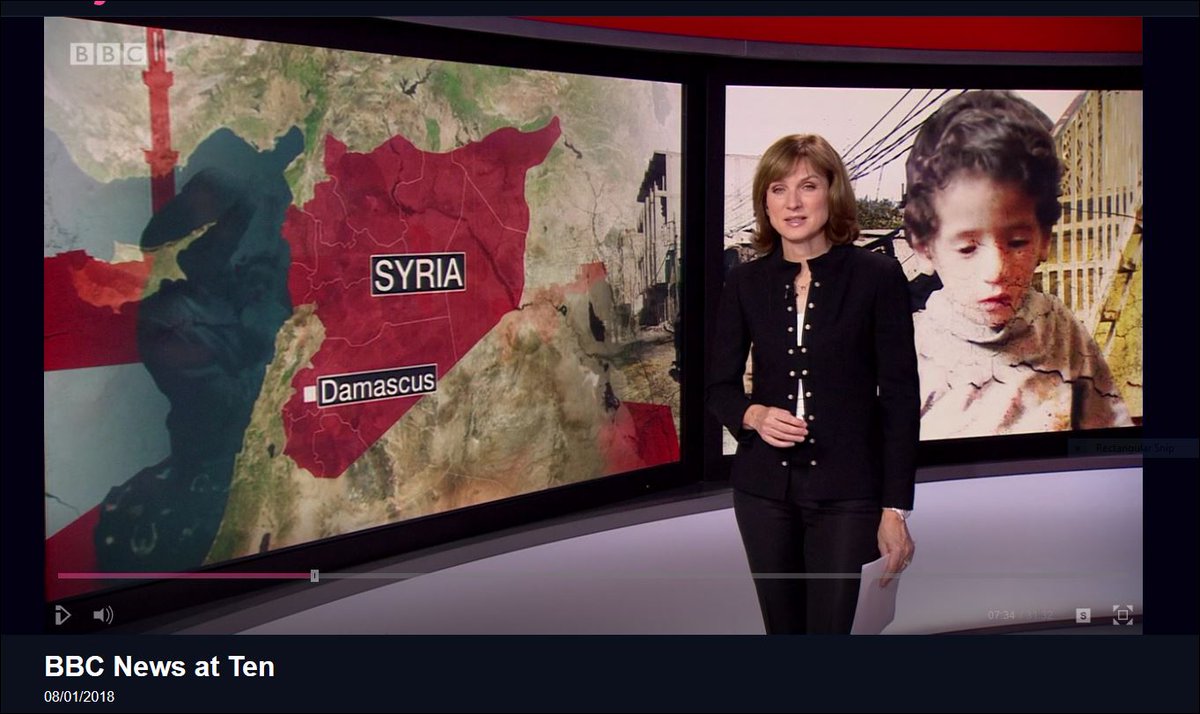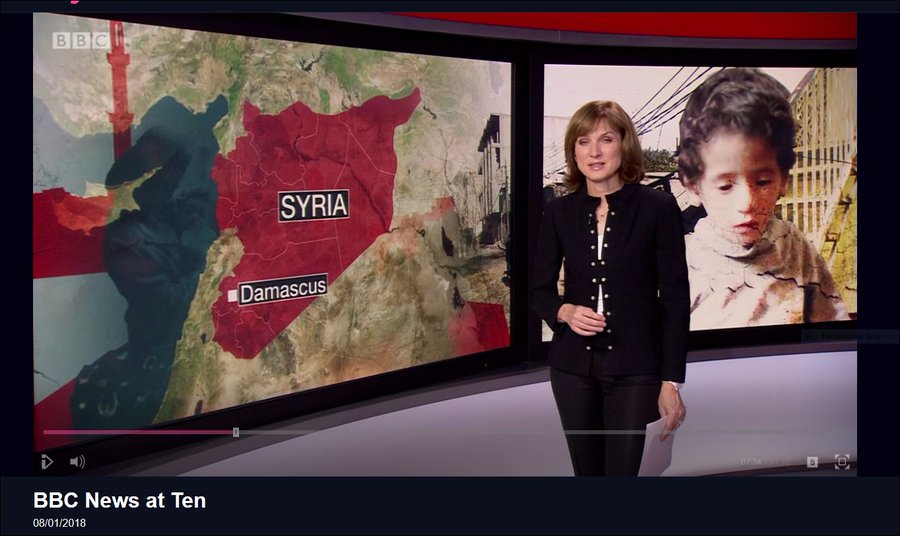In het tien uur nieuws ('s avonds) op BBC tv sprak presentator Fiona Bruce over 'de door Rusland gesteunde Syrische troepen'. Uiteraard is dit uiterst negatief bedoeld....... .Dit soort praat hoor je nooit als het gaat om de reli-fascistische dictatuur van Saoedi-Arabië, die door de VS en Groot-Brittannië, wordt gesteund bij de genocide uitvoering op de sjiitische bevolking van Jemen.......
Overigens doet de BBC hetzelfde als het over de Oost-Oekraïense separatisten gaat, routinematig krijg je dan te horen: 'The Russian backed rebels', terwijl er NB geen flinter bewijs is voor deze opmerking...... Even routinematig voegt men daar dan ook nog even de leugen aan dat er daadwerkelijk Russische troepen vechten in Oost-Oekraïne........ Geen bewijs, maar als je het maar genoeg herhaalt wordt het bij de meeste luisteraars/kijkers als waarheid opgeslagen in de hersenpan...... Door deze leugens krijgen die separatisten een slechte naam, immers ze worden door Rusland gesteund en zoals je weet: in de reguliere westerse (massa-) media: Rusland staat zo ongeveer voor al het kwaad in de wereld........
De separatisten in Oost Oekraïne hebben groot gelijk dat ze zich afscheidden van Oekraïne, immers zij hadden voor de overgrote meerderheid (democratisch) gekozen voor president Janoekovytsj en niet voor de corrupte neonazi Porosjenko, die door de VS middels een opstand en coup aan het bewind werd gebracht (hoofdverantwoordelijk destijds: VS minister van Buitenlandse Zaken Hillary Clinton, die daar maar liefst 4 miljard dollar voor vrijmaakte......).............
Uiteraard is dit soort van berichtgeving door de 'onafhankelijke' BBC, om de luisteraar/kijker schrik en haat aan te jagen voor/tegen Rusland, we moeten immers klaargestoomd worden voor een oorlog tegen Rusland en daar kunnen niet genoeg leugens voor gebruikt worden dat blijkt wel (voor de zoveelste keer)......
Moet je nagaan: er gaat bijna geen dag voorbij of men doet gewichtig over het kwaad dat 'fake news' wordt genoemd......... Je hoeft na het voorgaande niet te vragen 'wie daar de schuldigen zijn', juist: de Russen of Rusland trollen........ ha! ha! ha! ha! ha! ha! ha! ha! ha! ha! Terwijl keer op keer blijkt dat deze leugens niet kloppen en de VS zelf niet anders doet dan andere landen hacken en afluisteren (en dan het liefst 'bewijs' achterlaat voor de Russische bemoeienis [zie de Vault 7 documenten op Wikileaks], dit nog naast het manipuleren van de boel in een groot aantal landen............

We need to talk about what happened on BBC News at Ten [OPINION]

BBC
News at Ten has
a problem. And so does BBC
News in
general. It manifestly fails to present a balanced account of global
conflicts where the US or UK have vested interests. And as the US and
UK have some stake in almost every global conflict, this is a very
big problem.
BBC News at Ten
On
8 January, BBC
News at Ten covered
the devastating conflict in Syria. And host Fiona Bruce referred to
Syrian government forces being backed by Russia. This happens often
in theatres of war where Russia has an interest. Think Ukraine,
Georgia, and so on. But as Media
Lens pointed
out that night, rarely is the same approach taken in reverse; when
the superpower influencing events is the US or UK.
Fiona Bruce used the phrase, 'Syrian government forces, backed by Russia', on #BBCNewsTen last night. Why does @BBCNews not routinely use the phrase, 'Saudi government forces, backed by the US and the UK', when reporting on #Yemen? bit.ly/2EpAPj0
Media
Lens granted
the BBC right
of reply, calling on editors to explain the behaviour. Crickets.
Why won't the editor of BBC News at Six and Ten, @paulroyall, and the @BBCNews foreign editor, @AndrRoy, respond to huge public concern about biased @BBCNews reporting? #Yemen #Syria twitter.com/medialens/stat…
The standards adopted by this great institution are supposed to make it first class in media, but this [is] not the case…
Unfortunately, these standards are no longer applied as [they] should be. Eventually I took from the BBC… today I leave it as it is no longer like me nor am I like it. The news on my wounded homeland departed us.
But why?
Speaking
at a Real
Media event
on ‘Media bias and big political events’, the University of
Glasgow’s Greg
Philo explained
the seemingly rightward shift of BBC
Newscoverage.
He traced it back to the rise of Blairism and the invasion of Iraq.
From then on, conversations in parliament were based on a
near-universal acceptance of neoliberalism,
in both domestic and foreign policy. And as the BBC saw
its role as providing balanced reporting of those views, they failed
to make space for broader discussions. As Philo explains
[0.49]:
The BBC, which is supposed to be public – supposed to be representing a range of views, interprets its rubric as being simply to report what goes on in parliament. So if parliament is substantially to the right, then the BBC sees no reason to report that section of the population which are on the left. Even if there is a huge number of people who want left-wing policies in some areas.
And
this is bigger than Syria and Yemen.
It affects almost all reporting. And the dominance of establishment
figures in senior roles at the BBC perpetuated
this slide.
Former
BBC Trust head Rona
Fairhead was
an old
ally of
George Osborne and a board member of HSBC. And James
Harding,
the BBC’s former Director
of News and Current Affairs, previously worked for the Murdoch
press. While Editor of The
Timesnewspaper,
he was responsible for exposing the
identity of police blogger NightJack by hacking the
blogger’s email accounts – which his legal team
then failed to
mention during a court case against the action. Harding has also
gone on the record as ‘pro
Israel’.
This
filters down into lower-level editorial decisions. Like in the case
of Raffi Berg. In 2013, a devastating report by Electronic
Intifada revealed
the BBC online
editor was instructing journalists to skew reports on
Israel-Palestine in favour of Israel. While hundreds of Palestinians
were losing their lives during Israel’s eight-day assault on
the Gaza Strip in 2012, Berg was emailing journalists
with ‘guidance’ to maintain a pro-Israel tone in their reports.
Building a better BBC
Editors
and journalists at the BBC reading
this might feel it’s unfair to single them out. They aren’t the
only media outlet doing this, and they aren’t the worst. That is
entirely true. But it is also entirely missing the point. It is
precisely because the wider media landscape is filled with such poor
reporting that the role of the BBC is
so necessary. And it’s why silence is not the right course for
change. As Greg Philo concludes
[4.04]:
Attack, attack, attack them. Because it’s our media. We own the BBC. Get on it and insist that our views are heard.
Licence
fee payers have the right to demand better, and the BBC should
take the opportunity to do better.
Zie ook: 'BBC W.S. anti-Russische propaganda met kritiek op Russische 'anti-westerse propaganda.....''
en: ''Fake News' hysterie willens en wetens gelanceerd om sociale media tot zwijgen te brengen, Rusland te demoniseren en daarmee de waarheid te verbergen........'
en: 'Oekraïense neonazi-junta Porosjenko ontvoert en martelt op grote schaal........'
en: 'BBC World Service voert dagelijks campagne tegen Rusland in voorbereiding op WOIII (?!!).... Oekraïne onder de loep.....'
en: 'Russische jager werd neergehaald boven de Syrische grens, aldus BBC World Service.......'
en: 'Brexit Campaign Plumbs New Depths as British PM Equates Putin with Terrorist Leader' Dit bericht komt van het blog van Stan van Houcke, hierin wordt Putin als de grote promotor van een Brexit neergezet, plus een uiterst smakeloze vergelijking.......
en: 'BBC anti-Russisch propaganda en verder nepnieuws (of: 'fake news')........'
en: 'Jonathan Marcus (BBC) met anti-Assad propaganda: Deir ez-Zor ligt op de weg van Teheran naar Libanon.....'
en: 'BBC World Service ontkent gekleurde informatie over Brexit te hebben verstrekt..... AUW!!'
en: 'BBC World Service bol van EU propaganda........'
en: 'George Orwell standbeeld voor het BBC hoofdgebouw.......... ha! ha! ha! ha! ha! ha! ha! ha!'

